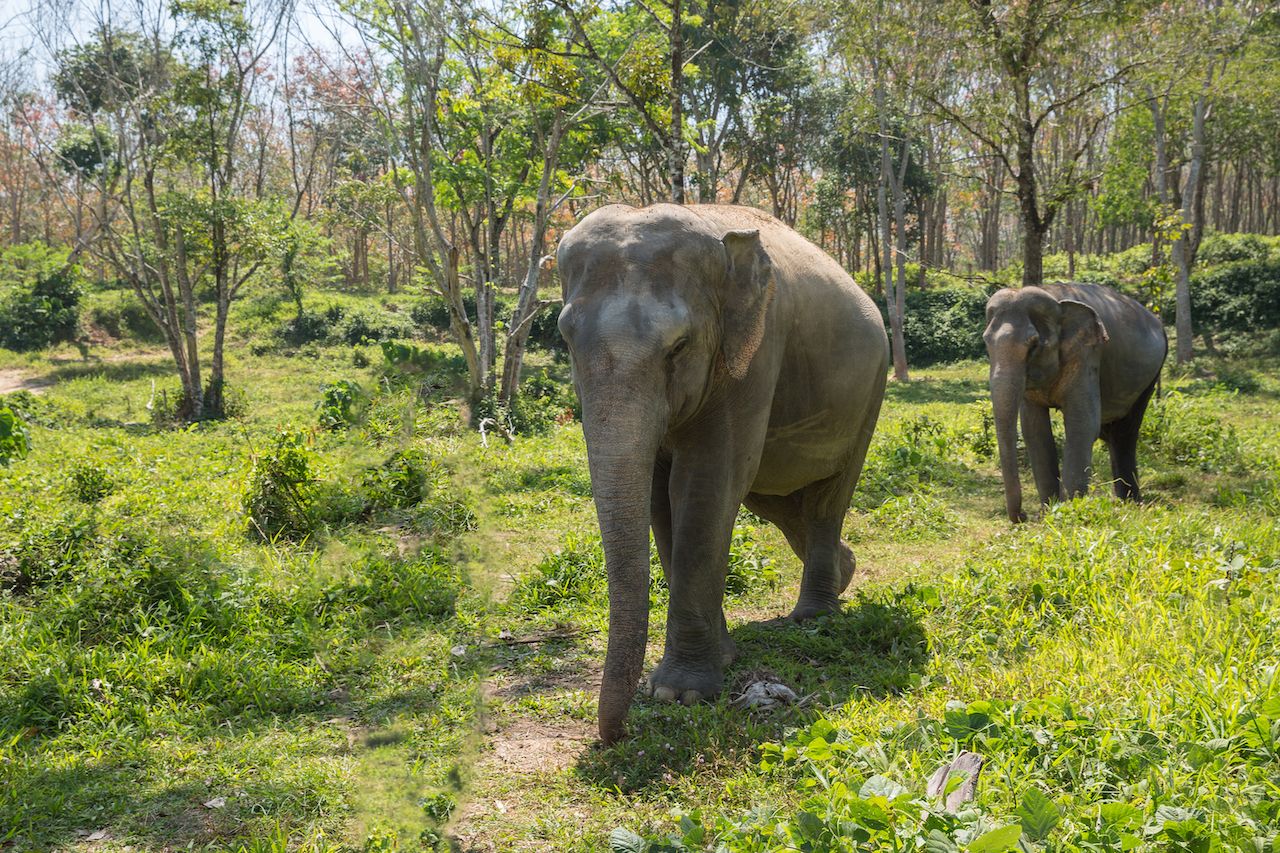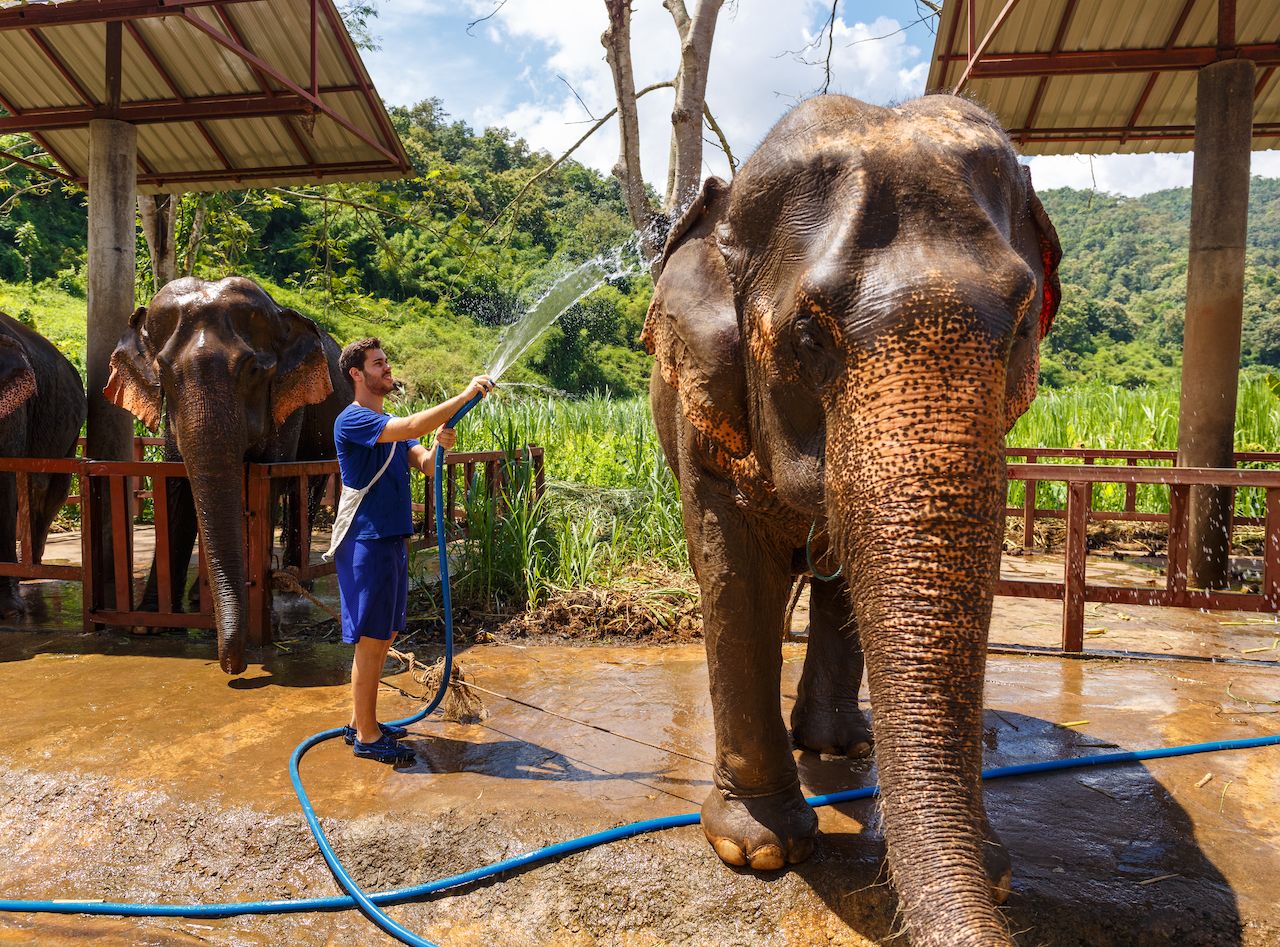LATEST TRAVEL

Animal welfare is increasingly top of mind for modern travelers not wanting to see their tourism dollars used for exploitative profit. In Southeast Asia, elephant riding has taken center stage. Reports of “elephant breaking,” the violent process of taming and domesticating an elephant for commercial use, made their way to the public eye in 2014 following research conducted by World Animal Protection and other welfare agencies, prompting international outcry from the mainstream media, travel sites, and even some tour operators, including Intrepid Travel.
Intrepid removed elephant rides from its roster of tours in 2014, joining and inspiring over 200 businesses that have done the same. Prior to 2014, Intrepid included elephant rides on certain tours in Thailand but stopped doing so after a report from the WAF. Co-founder Geoff Manchester speaks to why his views on elephant riding have changed over time and what inspired the brand to take a firm stance against the activity.
How was Intrepid Travel born, and what is your overall goal?
Thirty years ago, Intrepid Travel was founded by my business partner, Darrell Wade, and me with a vision of changing the way people see the world. After backpacking through Africa in a rebuilt overland truck — where we spent time in small villages, experiencing the profound impact our tourism dollars brought to local communities and, in turn, giving us real-life experiences — we returned to Australia to create a style of travel that gave back to the people and places we visited. Now, Intrepid Travel has grown to be the world’s largest adventure, B Corp certified travel company, running more than 1,000 trips in over 120 countries. Our overall values have remained the same — we want to be the best travel company for the world.
How did the partnership with World Animal Protection come to be?
About five years ago, Southeast Asia was our most popular travel destination, with elephant rides being a major allure for travelers. Although it was often portrayed as ethical and fostering connection between humans and animals, the commodity was based more on the income potential, and the ethics became increasingly blurred. Through our not-for-profit The Intrepid Foundation, we decided to partner with World Animal Protection to investigate whether these venues were sustainably run or were unethically operated. What we saw through the research was that elephants were being captured, beaten and broken, and although they claimed to adhere to animal welfare practices, most venues weren’t following the simplest guidelines. Putting our purpose ethos before our profit, we knew that we had to ban elephant rides on all our tours, making us the first global tour operator to do so. Since then, more than 200 businesses have followed suit.

Photo: LAMBERTO JESUS/Shutterstock
The movement to ban elephant rides has catapulted into the mainstream in recent years. Was there a tipping point where you noticed a cultural shift?
Like many global movements, it often takes one trusted person or business to take a stance, then others follow. Since the World Animal Protection research that Intrepid funded, there’s been a global movement that presented itself in all forms of media. Humans have always had an emotional connection to animals, especially the ill-treatment of animals, and once they were informed about the horrific breaking of elephants so that travelers can ride on them, the media helped connect people from all around the world to the cause, and from there it’s become a much more well-known issue. As people around the world become more socially and ethically conscious, more people are now aware of and firmly against riding elephants. We’re so thankful to be part of the cultural shift toward protecting and rehabilitating elephants.
What alternative activities should travelers consider?
I encourage travelers to visit ethical animal sanctuaries or safari through the wilderness, watching the majestic elephant in its natural habitat. Having led tours myself that included elephant rides to now having visited elephant sanctuaries as an alternative, I’ve seen firsthand the power of connecting with a rehabilitated elephant from afar. There’s a surreal connection when you gaze into an elephant’s eyes, especially one who’s been rescued from captivity. I highly recommend Intrepid Travel’s Thailand and Laos Adventure and Highlights of Thailand tours, both of which allow you to witness elephants roaming in their natural habitat. Additionally, on Intrepid’s Sri Lanka Expedition: Wilderness & Wildlife expedition, you can visit Project Orange Elephant, an organization run by the Sri Lanka Wildlife Conservation Society. SLWCS encourages more sustainable farming practices to help wildlife and humans coexist peacefully.
For Geoff, when did your opinion change on elephant riding? What was it that did it for you?
Intrepid Travel’s first tours, 30 years ago, which were led by me, brought small groups of travelers to Southeast Asia, with the most popular attraction being elephant rides. Over time, it became obvious to me and many others in our business that people were capitalizing on elephants as attractions. Slowly, I became suspicious of the attraction and World Animal Protection’s research was undeniable — elephants were suffering at the expense of travelers. It was at this moment that we all agreed to remove all elephant rides from our tours. Instead of reprimanding ourselves for the past, we wanted to ensure that all our travelers were helping to protect and support the rehabilitation of elephants from then on.
Is abstaining from activities like elephant riding enough? Or should the traveler and tour provider be doing more to support animal welfare in the places they visit?
Abstaining from elephant rides is a huge step in protecting the beautiful mammal. As a business that focuses on giving back to the places we visit, we always encourage travelers to go a step further and support animal welfare projects. Through our not-for-profit, travelers can donate to many projects that protect, rescue, and rehabilitate elephants and other wildlife. Intrepid matches all donations dollar-for-dollar and pays the administration fees, doubling each donation’s impact. We also encourage travelers to become advocates for animal welfare, like sharing their safari and animal sanctuary images on social media so their friends and family become interested in learning about more ethical experiences.
What can a traveler do to support animal welfare in the places they visit?
Aside from visiting ethical animal sanctuaries or traveling to see them in the wild, if you want to double your impact, donate to reputable not-for-profit organizations like The Intrepid Foundation. The Intrepid Foundation works with local NGOs like Friends of the Asian Elephant to provide funds for elephant rehabilitation. In the 15 years since we began supporting this project, our travelers have donated nearly 150,000 Australian dollars ($101,000) to the project, which is matched dollar-for-dollar by Intrepid Travel to provide funds that have treated more than 4,500 sick or injured elephants. ![]()
The post Intrepid Travel co-founder speaks to why the company is against elephant riding appeared first on Matador Network.
from Matador Network https://ift.tt/2pqOHHr


No comments